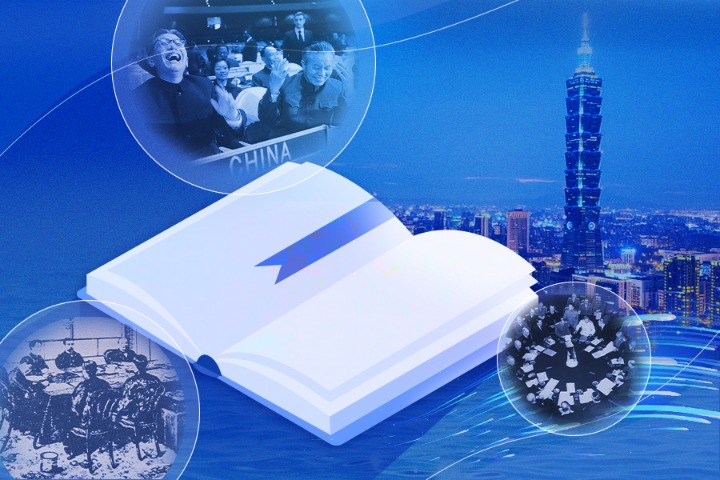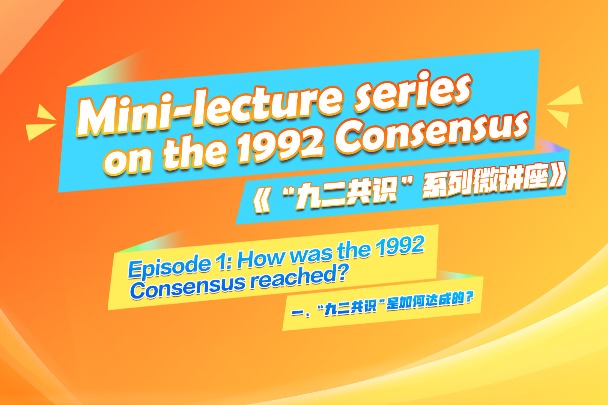Cross-Strait exchanges help boost mutual understanding

Groups of students from the Chinese mainland and Taiwan recently visited each other's homes and schools to extend the hand of friendship. Zhang Yi reports.
In a significant move toward promoting understanding across the Taiwan Strait, a group of 37 students and teachers from universities on the Chinese mainland visited Taiwan last month, marking the first such visit for three years.
Organized by the Ma Ying-jeou Foundation, the nine-day trip, which ended on July 23, aimed to foster cross-Strait youth exchanges amid growing tensions.
The visit provided opportunities for cultural and academic exchanges, as well as the chance to develop strong bonds between young people on both sides of the Strait.
During their time in Taiwan, the mainlanders took part in cultural exchanges, visited prestigious universities and explored various cities and natural wonders. The warm hospitality and enthusiasm shown by the people in Taiwan left a deep impression on the mainland students.
The students were invited by Ma Ying-jeou, a former "president" of Taiwan, after he led a group of students from the island on a visit to the mainland in late March and early April, during which they visited many historic sites and talked with local students.
"The enthusiastic response frm the mainland and the interaction between students from both sides touched me deeply," Ma said, adding that the trip made him decide to invite the mainland students in the hope of continuing the exciting youth exchanges.
Li Yiqi, an undergraduate at Hunan University, attended the exchange session with Ma and the Taiwan students when they visited her school in April. The atmosphere was lively, and Ma spoke in the Hunan dialect, despite it being his first visit to the province, she said.
"I was surprised that he then invited us to visit Taiwan," Li said, adding that Ma accompanied the mainland students throughout their trip, chatting with them in their vehicle and even leading them on early morning runs and exercises.
Another student who visited Taiwan, Zhang Yumeng, an undergraduate at the Law School of Wuhan University, was present when Ma and the Taiwan students visited her school in March.
"I remember Ma being very excited and asking us if we would like to visit Taiwan. All of us in the room answered 'yes'. I never thought it would actually happen so quickly," she said. "I could feel that Ma was very sincere about promoting cross-Strait exchanges."
Hospitality, enthusiasm
During their trip to Taiwan, the mainland students were touched by the hospitality and enthusiasm for interaction shown by their counterparts on the island as they visited four universities and held a number of exchange sessions with local students.
Zhang said she discovered that young people on both sides of the Strait want the opportunity to communicate with each other and to travel to their respective homes.
The young people from Taiwan were particularly interested in the customs and traditions of the mainland, along with mobile payment, campus life and common topics among young people such as academic pressure, employment concerns, marriage and family issues, she said.
They also enjoyed using the mainland's social media platforms to learn about life on the other side of the Strait, she added.
In Taiwan, Zhang said she met a student at the island's Taiwan University who had visited the mainland before and had a very positive impression as a result of that experience.
She added that the student told her that his personal experience of the mainland's customs and traditions was completely different from what he had learned through the media in Taiwan.
Li, the mainland student, said misunderstandings can arise from a lack of understanding and communication, and there are many common topics and shared perspectives between young people on both sides of the Strait.
Li recalled that a Taiwan student who was very interested in the mainland came to her group's hotel almost every night to chat until very late. When the mainlanders left, the student gave each of them a handwritten letter expressing the hope that they would be able to stay in touch.
She also said she had encountered many differences between the two sides in Taiwan. For example, the contrasting attitudes toward simplified and traditional Chinese characters, which are used on the mainland and Taiwan respectively.
"I voluntarily switched to using the traditional Chinese input method when communicating with the Taiwan students. To my surprise, they also happily switched to using simplified characters when messaging me," Li said, adding that the young people from both sides were very considerate to each other.
Hao Ping, Party chief of Peking University who led the mainland visitors' group, said the trip was unforgettable for all the mainland students, and they could feel the welcome and goodwill of the Taiwan compatriots, which made him feel that the emotional bonds between the two sides are inseparable.
Through the visit, the exchanges between young people on both sides of the Strait will become deeper and their friendship will deepen, which will definitely be beneficial to the peaceful development of cross-Strait relations, he said.
Hsiao Hsu-tsen, director of the Ma Ying-jeou Foundation, said, "During the farewell dinner, many mainland students shed tears, feeling reluctant to be separated from their Taiwan counterparts, and they made arrangements to meet again."
Hsiao said the Taiwan people the mainlanders encountered during the trip gave them a thumbs-up and urged the foundation to promote more youth exchanges on both sides of the Strait.
Important activity
Ma, the former "president" of Taiwan, said the visit was the most important youth exchange activity between the two sides in recent years, and also the best birthday gift he could receive as he turned 73 last month.
He criticized the island's current administration, led by the Democratic Progressive Party's Tsai Ing-wen, for the stagnant state of cross-Strait relations in which communication with the mainland has almost ground to a halt.
When Ma was elected as Taiwan's "president" in 2008, the authorities allowed mainland students to study at Taiwan universities, and more than 800 young mainlanders studied on the island that year.
By the time he stepped down in 2016, the number had soared to 42,000, he said.
Since then, as cross-Strait relations deteriorated after the DPP came to power and with the impact of the COVID-19 pandemic, cross-Strait exchanges were almost completely suspended for more than three years, he said.
Expressing deep concern about the state of cross-Strait communication in recent years, Ma said that he hoped the visit would signal a turning point in relations and that communication would return to normal.
In addition to continuing to organize exchange programs between young students, his foundation will also promote a forum for cross-Strait university presidents in the future, he said.
Zhang, the mainland student, said, "Our trip to Taiwan was seen as a breakthrough by many. People were eager to expand and restore exchanges and normalize relations because the desire for communication on both sides was urgent.
"If we truly want to understand each other, we need to go out for face-to-face communication, meet and integrate with each other to truly increase understanding while respecting our differences."
Li said that since the mainland group returned home, students on both sides have stayed in touch. Recently, one of the students from Taiwan came to work in Hunan, so they are planning a dinner together and to take him on a trip.
"As the ones who have had firsthand experience of Taiwan, we can spread the word and share the comprehensive, genuine Taiwan that we have witnessed with the people around us," she said.
She added that mainland students will transmit the goodwill they received and tell others that the young people in Taiwan are friendly and eager for contact.
- Top News
- Events honor role of first provincial governor in modernizing Taiwan
- 'Soul Ferryman' of Taiwan Strait: Liu De-wen's 22-year mission to bring veterans home
- Taiwan-born kendo instructor grows cross-Strait ties
- Chinese mainland says cross-Strait consultation possible with recognition of '1992 Consensus'




